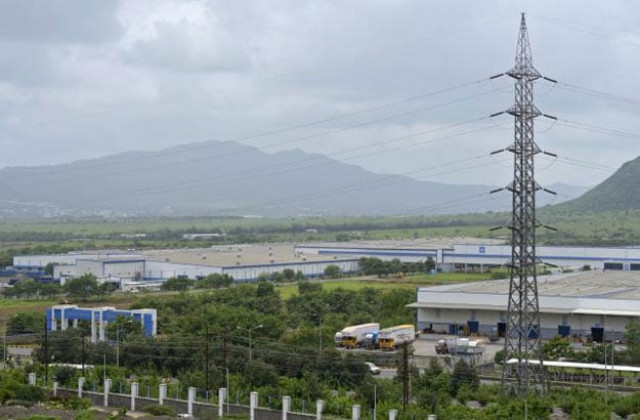India's states sidestep stalled reform, go it alone to woo investment
A crash in commodity prices as well as slowing global growth have made India a attractive bet for foreign investors

A general view of General Motors plant is seen in Talegaon, on the outskirts of Pune, India, August 11, 2015. PHOTO: REUTERS
The 5-year deal, announced last weekend, is a reminder of the pulling power of India's wealthiest states - even as the central government under Prime Minister Narendra Modi hits its biggest reform roadblocks to date, over tax and land reform.
India's states, often led by charismatic local heavyweights, have long courted big businesses individually.
But for the first time under Modi, previously chief minister of the state of Gujarat, states are actively encouraged to find solutions to reform hurdles and to compete themselves for investors' cash.
Read: MoU signed: Manufacturer of iPhone to invest $5b in India
That has provided reassurance for investors betting on India's economic growth, a lifeline for big business and a boost for states desperate to create jobs.
Days before Foxconn's agreement, General Motors announced it would invest $1 billion in India, largely to expand its main plant in Maharashtra. On Tuesday, South Korean steelmaker POSCO said it would set up a new steel plant in the state, with an Indian partner.
The forward motion in the states contrasts sharply with stalled reforms in New Delhi, which has some Indian businesses fretting a full fledged recovery will not happen until 2016-17.
"The states have to move towards making investments easier, that is in the power of the state government," said R.C. Bhargava, the veteran chairman of Maruti Suzuki, India's largest carmaker.
"The expectation is the competition between states will drive the so-called less fortunate states to change their systems and regulations, to create the infrastructure and environment for investment."
Maharashtra's chief minister Devendra Fadnavis, a young party official from the Hindu nationalist heartland said to enjoy favour with Modi, met Foxconn's management for the first time when he travelled to China with Modi in May.
Officials travelling with him said Terry Gou, Foxconn's chief, spent a day with Fadnavis then, and led a factory tour.
They met several more times before a charm offensive - and possibly Gou's professed love of Indian naan bread - got Foxconn what it needed: a hint that value-added tax refunds could be extended beyond the usual 7-9-year limit, permission for solar power generation and help with financial transfers.
"The bottom line of this entire thing is the production cost per unit. That should be less than China, otherwise there is no point," said Bhushan Gagrani head of the Maharashtra Industrial Development Corporation, who travelled with Fadnavis.
TRAFFIC JAMS
India's states have been sidestepping what officials call reform "traffic jams" in New Delhi, making the most of greater freedoms under Modi to manage everything from budgets to relaxing rigid labour laws for the first time in decades.
After spending much of the year battling tough opposition to his bid to make it easier to buy farmland for industry through a federal law, Modi last month decided that it would be easier to let states set their own rules.
Read: Indian business dreads lifting of Iran sanctions
Ten states accounting for almost half of India's economy, and most of them led by the ruling Bharatiya Janata Party, have said they want to enact their own laws to ease land deals that boost infrastructure development.
Local businesses are fretting over reform setbacks - such as delays to a tax shake-up - but a crash in commodity prices as well as slowing global growth have made India a relatively more attractive bet for foreign investors.
"The pace of implementing reforms has indeed been more disappointing than we or the market consensus had hoped, but a bit of realism is necessary," said Kamakshya Trivedi, managing director in emerging market research at Goldman Sachs in London.
Of course, not all industries can work without national laws. Foreign supermarkets have found it hard to open in India because only certain states allow them to, affecting scale.
Most of the recent flush of foreign investment, including this week's new plant launch in Andhra Pradesh by Chinese phone maker Xiaomi, in partnership with Foxconn, is from businesses targeting India's increasingly affluent consumers.
And there are risks to a states-led development that will be skewed to India's wealthier regions, like Gujarat, Karnataka, which includes Bengaluru, or Maharashtra, home to financial hub Mumbai, and at the expense of others.
"We have seen some states coming up reasonably well over the last few years - Madhya Pradesh, Rajasthan - but to make a bet there will be more even development is difficult," said Gautam Chhaochharia, head of India research at UBS in Mumbai.
"It's a chicken and egg thing. You already have industry clusters ... and if you are setting up manufacturing, you can't ignore those clusters."



















COMMENTS
Comments are moderated and generally will be posted if they are on-topic and not abusive.
For more information, please see our Comments FAQ